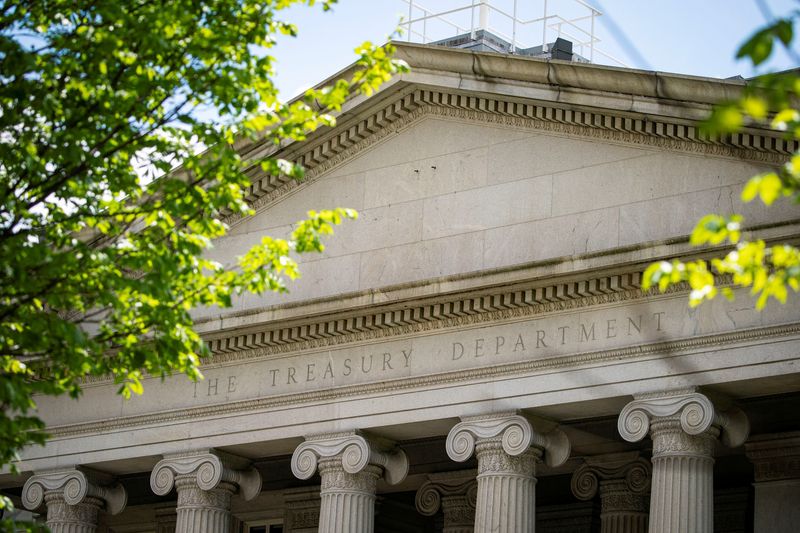By Karen Brettell
(Reuters) - The U.S. Treasury Department is at risk of defaulting on its debt if Congress doesn't act to lift the debt ceiling before it is reached, which could happen as soon as June 1. For holders of Treasury bills, notes and bonds, that raises uncertainty over whether the issues they hold will be affected, and what happens if the debt is not repaid or an interest payment is skipped.
Here are six key questions:
DO ALL BONDS DEFAULT IF ONE PAYMENT IS SKIPPED?
No. Treasuries do not have any cross default provisions so a skipped payment on one issue will not necessarily impact others.
So far, moves in the Treasury bill market reflect localized concern over certain issues that mature in early June, when the U.S. Treasury Department is viewed as most likely to run out of funds. Yields on these bills are trading at higher levels than comparable debt that matures later in the year.
WILL DEFAULTED ISSUES STOP TRADING?
Analysts say it is critical that Treasuries can continue to be transferred on the Federal Reserve’s settlement system, the Fedwire Securities Service. The Treasury can ensure the securities remain on Fedwire by giving notice the day before that a payment will be delayed. It should do this daily until it can make the payment.
WILL DEBT HOLDERS BE COMPENSATED FOR THE PAYMENT DELAY
Analysts assume that debt holders will be paid for the delay, but its not clear exactly how this would work. JPMorgan (NYSE:JPM) estimates that this would most likely take the form of a floating rate on missed coupon or bill payments.
The Treasury Market Practices Group said in December 2021 document, however, that “it would require explicit legislation by Congress to provide compensation to holders of securities subject to a delayed payment on Treasury debt for the delay in these payments.”
In 1979 the Treasury was late in redeeming some Treasury bills due to technical difficulties. Investors who missed their interest or principal checks were reimbursed for the delay.
CAN TREASURY ROLL OVER MATURING DEBT?
Yes. Treasury can roll over maturing coupon securities on the maturity date without affecting its outstanding debt or remaining cash balance as long as it makes the coupon payment due on the same day, according to JPMorgan.
Treasury bills are more complicated as they are sold at a discount and then repaid at par. Some analysts note, however, that given the Treasury faces multiple bills in addition to its debt payments that it would be more likely to cancel auctions and delay debt payments once it hits its debt limit.
The Treasury on Thursday announced plans to sell four-week and eight-week bills and 161-day cash management bills on May 30. It has not yet announced other auctions that are expected to include other bill maturities in early June.
WOULD RATINGS DOWNGRADES LEAD TO FORCED SELLING
Many bond holders including money market fund investors buy only very highly rated debt, and ratings downgrades could impact demand. But there are caveats that could limit large-scale forced selling.
Money fund rules and regulations do not require immediate liquidation upon default, JPMorgan notes, adding that boards of directors at funds likely have discretion on whether to hold or sell. Few of these would be likely to choose to sell defaulted securities at distressed levels.
Money market funds also invest in repurchase agreements that are backed by Treasuries. Debt with near-term maturities is not typically used as collateral, however. Longer-dated debt with coupon payments due in the risk period may need to be replaced, or face higher haircuts, which are deductions applied to the value of the assets.
WOULD A DEFAULT IMPACT TREASURY COLLATERAL AT CLEARING HOUSES
Treasuries are used to back trillions of derivatives at clearing houses. As with repos, debt coming due in the near-term is not usually accepted to back these trades, but any Treasuries with coupons at risk of not being repaid may face higher haircuts or need to be replaced. Margin requirements could also increase as a result of heightened market volatility arising from any default.
(This story has been refiled to add the word 'bill' in the headline)
